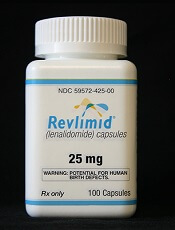
Photo courtesy of Celgene
The European Commission (EC) has approved lenalidomide (Revlimid®) for the treatment of adults with relapsed or refractory mantle cell lymphoma (MCL).
The EC previously approved lenalidomide as a single agent to treat adults with newly diagnosed multiple myeloma who are not eligible for transplant and in combination with dexamethasone to treat adults with multiple myeloma who have received at least 1 prior therapy.
The EC also approved lenalidomide for the treatment of patients with transfusion-dependent anemia due to low- or intermediate-1-risk myelodysplastic syndromes associated with an isolated deletion 5q cytogenetic abnormality when other therapeutic options are insufficient or inadequate.
Lenalidomide is a product of Celgene Corporation.
The EC’s decision to approve lenalidomide for MCL was based on data from a phase 2 trial known as SPRINT or MCL-002. The study included 254 MCL patients who were refractory to their last treatment or had relapsed 1 to 3 times.
The patients were randomized (2:1) to receive lenalidomide (n=170) or a single-agent therapy of the investigator’s choice (n=84), which included rituximab, gemcitabine, fludarabine, chlorambucil, and cytarabine. Patients who progressed on investigator’s choice could cross over to the lenalidomide arm.
At a median follow-up of 15.9 months, the overall response rate was 40% in the lenalidomide arm and 11% in the investigator’s choice arm (P<0.001).
The complete response rates were 5% and 0%, respectively (P=0.04). The median duration of response was 16 months and 10.4 months, respectively.
Lenalidomide significantly prolonged progression-free survival. The median was 8.7 months in the lenalidomide arm and 5.2 months in the investigator’s choice arm (P=0.004).
However, there was no significant difference in overall survival between the treatment arms. The median was 27.8 months in the lenalidomide arm and 21.2 months in the investigator’s choice arm (P=0.45).
The incidence of treatment-related adverse events was 84% in the lenalidomide arm and 60% in the investigator’s choice arm.
Common adverse events that occurred more frequently in the lenalidomide arm than the investigator’s choice arm were neutropenia (51%), anemia (29%), diarrhea (23%), fatigue (21%), constipation (17%), pyrexia (17%), and rash (16%).


